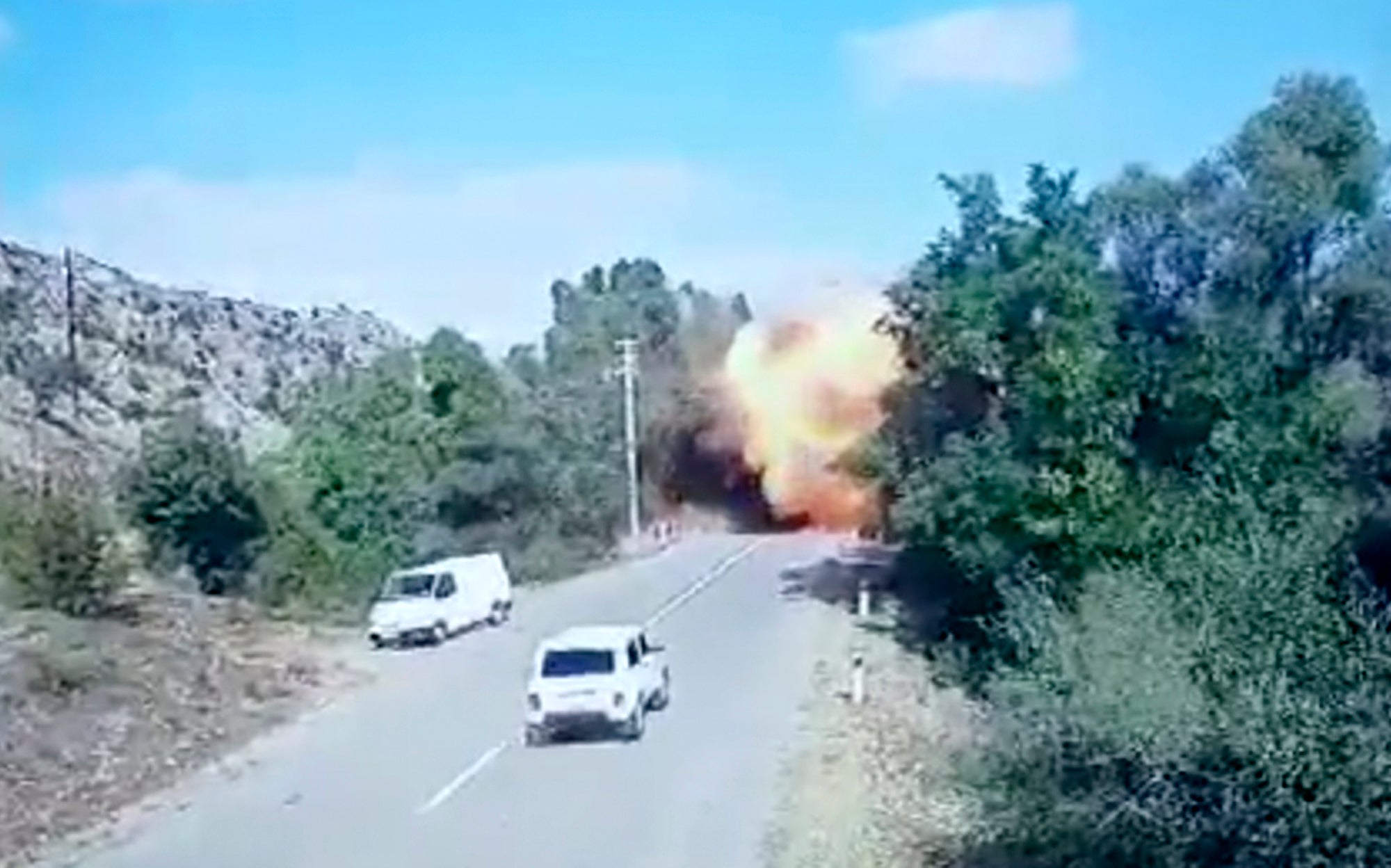AP Explains: What lies behind Turkish support for Azerbaijan
Turkey has firmly put its weight behind oil-rich Azerbaijan since a decades-old territorial dispute with Armenia flared anew

Your support helps us to tell the story
From reproductive rights to climate change to Big Tech, The Independent is on the ground when the story is developing. Whether it's investigating the financials of Elon Musk's pro-Trump PAC or producing our latest documentary, 'The A Word', which shines a light on the American women fighting for reproductive rights, we know how important it is to parse out the facts from the messaging.
At such a critical moment in US history, we need reporters on the ground. Your donation allows us to keep sending journalists to speak to both sides of the story.
The Independent is trusted by Americans across the entire political spectrum. And unlike many other quality news outlets, we choose not to lock Americans out of our reporting and analysis with paywalls. We believe quality journalism should be available to everyone, paid for by those who can afford it.
Your support makes all the difference.Turkey has firmly put its weight behind oil-rich Azerbaijan as a decades-old territorial dispute flared anew into an armed conflict over Nagorno-Karabakh a mountainous region situated within Azerbaijan controlled by Armenia-backed ethnic separatists.
Turkey, a NATO member with regional and global aspirations, has vowed to support longtime ally Azerbaijan “on the battlefield or the negotiating table,” if needed. However, the Turkish government has denied Armenian claims that it is sending Syrian fighters and F-16 combat jets to assist Azerbaijani forces in the conflict that broke out Sunday.
Here’s a look at what lies behind Turkey’s support for Azerbaijan, its involvement in the conflict and its implications.
WHY IS TURKEY SUPPORTING AZJERBAIJAN?
Turkey and Azerbaijan are bound by strong ethnic, cultural and historic ties and refer to their relationship as being one between “two states, one nation.” Turkey was the first country to recognize Azerbaijan’s independence in 1991 after the collapse of the Soviet Union, and the two have forged robust economic ties. Turkey is the main conduit for Azerbaijan’s oil and gas exports, and the ex-Soviet republic has become a major investor in Turkey.
On the other hand, Turkey has no diplomatic relations with Armenia and sealed its border with the nation in 1993 to show solidarity with Azerbaijan over Nagorno-Karabakh. Relations between Armenia and Turkey already were tenuous due to the the mass killings and deporations of Armenians by Ottoman Turks a century ago, Scholars consider those events to be the first genocide of the 20th century, which Turkey denies.
In 2009, Turkish President Recep Tayyip Erdogan stepped back from reconciliation efforts with Armenia that had angered Azerbaijan. Erdogan made the establishment of formal ties with Armenia conditional on its withdrawal from Nagorno-Karabakh.
HOW IS TURKEY INVOLVED IN THE CONFLICT?
Turkey’s military has been training Azerbaijani officers for decades. In August, their armed forces conducted large-scale military exercises in Azerbaijan. Turkey is also Azerbaijan's third-largest supplier of military equipment after Russia and Israel. It is known to have sold drones and rocket launchers, according to Ozgur Unluhisarcikli, Ankara director of the German Marshall Fund. Turkey may have sent military drone operators to help Azerbaijan in the current fighting, he said.
Turkey has repeatedly said that it would come to Azerbaijan’s aid, if asked, but there is no evidence so far that Turkey is actively involved in the conflict. Ankara has asserted that Azerbaijan has the capacity to fight without Turkish support.
The Turkish government has denied sending Syrian mercenaries to help Azerbaijan in the battle even though the Britain-based opposition war monitor, the Syrian Observatory for Human Rights, reported that as many as 850 Syrian fighters have arrived in Azerbaijan.
Turkey has also dismissed as “propaganda” claims by Armenia that a Turkish F-16 fighter jet shot down an Armenian SU-25 jet.
Turkey’s military involvement in the conflict for now is “more rhetoric than substance,” Unluhisarcikli said.
WHAT IS RUSSIA'S POSITION?
Although Russia and Armenia do not share a border, Armenia is a close Russian ally of Russia in the Caucasus region between the Black and Caspian seas, including hosting a large Russian military base. The base, with a garrison of about 3,000 soldiers, is in Gyumri, about 200 kilometers (124 miles) west of Nagorno-Karabakh and less than 10 kilometers (6.2 miles) from the Turkish border.
Armenian Prime Minister Nikol Pashinian has characterized the base as a key bulwark against a possible Turkish invasion.
Armenia and Russia are members of the Collective Security Treaty Organization, a military alliance of some former Soviet republics, not including Azerbaijan, raising the possibility that Armenia could call for military help from the alliance. Pashinian this week said he does not see an immediate need for calling on Russian forces to take action.
WHAT'S AT STAKE FOR TURKEY?
Experts see Turkey’s hardline rhetoric against Armenia as part of Turkey’s aspirations for global and regional leadership and Ankara's increasing efforts to resolve disputes through “gunboat diplomacy.”
The country has flexed its military muscle in Syria in a bid to prevent Kurdish militants from entrenching in a border region, in Libya where it has sided with the Tripoli-based government to safeguard a maritime delimitation agreement, and in the eastern Mediterranean where it sent a search vessel, accompanied by warships, to explore for energy in disputed waters with Greece.
“Wherever there is a problem, Turkey’s tendency has been to militarize the problem,” the Marshall Fund's Unluhisarcikli said.
With the conflict threatening to draw Russia in, experts think Azerbaijan will act with caution and limit any Turkish intervention.
“The support that Azerbaijan would request (from Turkey) would fall beneath the threshold that would anger Russia,” Unluhisarcikli said.
___
Associated Press writer James Heintz in Moscow contributed.